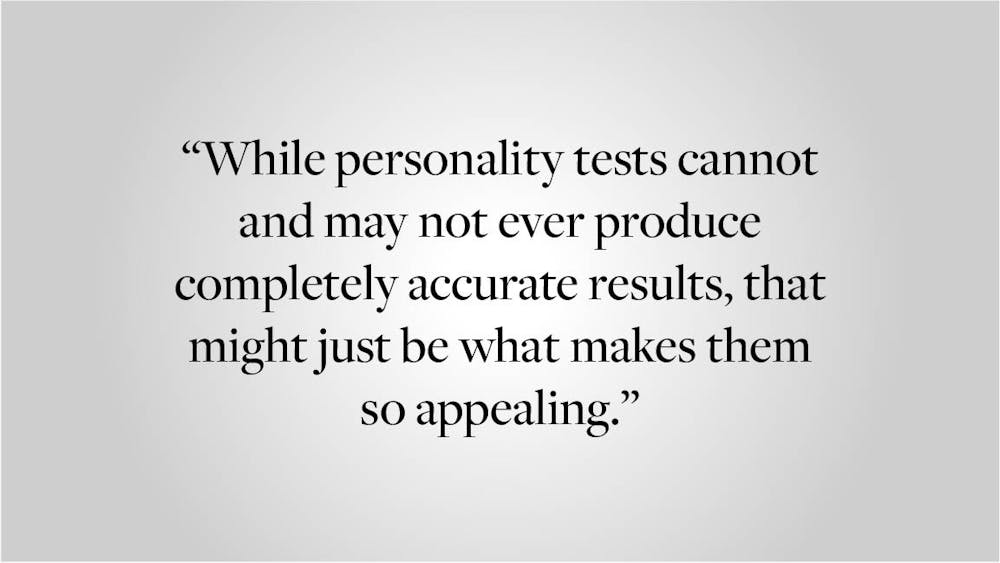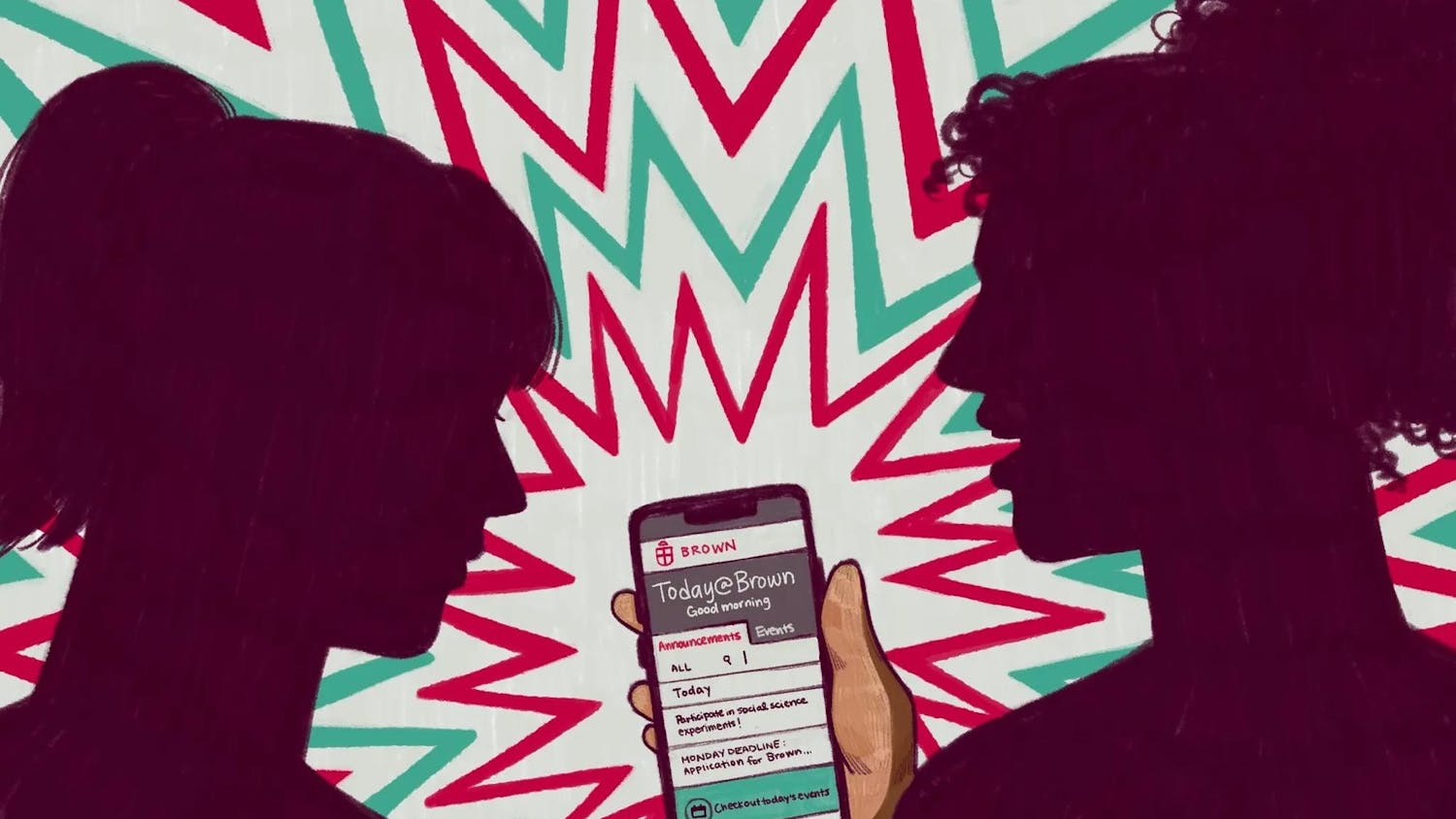I’m irresistibly drawn to personality tests — but not for the reasons you might think. While I enjoy taking these tests myself, my real interest comes from seeing my friends consider their answers. Through these experiences, I see how different people perceive the world and react to difficult scenarios. For example, one question in the Myers-Briggs Type Indicator asks how much the test taker agrees with the assertion, “You enjoy watching people argue.” While I watched some people scoff at the statement’s absurdity, I saw others admit they view arguments as popcorn-worthy entertainment. Sometimes, I dive into theoretical discussions with friends about what the statements mean (for instance, do light-hearted squabbles count as arguments?) and then compare the answers each one of us picks. Other times, I relish the opportunity to simply observe as a friend chews over the statements presented.
Despite the wide array of scientific articles that denounce personality-typing as pseudoscience, there’s a reason 1.5 million people take the MBTI each year. These personality tests are so compelling because they have the ability to put a name to what we already observe in reality. They satisfy an innate desire to learn more about ourselves and offer an easy way to describe that self to others. Through this process of introspection, we can better understand why we think and act the way we do, as well as what to watch out for under stressful circumstances.
At first glance, your four-letter MBTI test result may seem like gibberish. “What does it mean to be an ENFJ?” you may wonder. This 93-question test is an attempt by Isabel Briggs Myers and her mother Katharine Cook Briggs to classify personalities into four dichotomies: introversion-extraversion, sensing-intuition, thinking-feeling and judging-perceiving. While numerous psychologists claim the Myers-Briggs is totally meaningless, I disagree. While the test may not be scientifically proven to assign a personality type, taking the test itself can be an effective form of self-reflection that helps us distinguish our own thought patterns.
The first letter of your MBTI, E for extraversion or I for introversion, stands for whether you draw more energy from social interactions or alone time. The second letter, S or N, indicates how you prefer to make observations about the world. S-type sensors prefer to form conjectures based on tangible facts, and they value a practical application to the information they receive. Intuitives, on the other hand, prefer to look for patterns and apply higher-level concepts to future possibilities. These N-types are less tied down by current logistics and enjoy taking intelligent leaps of faith about the meaning of things.
The third letter, F or T, is based on how you make decisions. F-type feelers tend to make decisions based on personal values, while T-type thinkers try to remain logical, consistent and impersonal in making decisions. The fourth letter, P or J, describes how your outer life appears. Since P-type perceivers gather as many observations as possible before finalizing a decision, they may appear to be more flexible and spontaneous. By contrast, J-type judgers operate on a “less is more” tenet. They prefer to focus on a few observations and organize them before taking in new information. To the outside world, this is why J-types could appear as the more structured planners.
The MBTI is designed to pose questions that evaluate these cognitive functions on a percentage scale, generating your four letters based on how much you prioritize one function over the other. As it is with any self-assessment, the test is only as good as what you make of it: You must be honest with yourself when picking answers. That is why it can be dangerous for companies to assign people into jobs through the MBTI, as people might lie on the test to achieve a desired result or personality type. This use of personality tests strays from their intended purpose: self-actualization. Your results become more about company productivity and workflow than learning who you are.
Even if it has no scientific basis, no ability to calculate your personality or no potential to contribute to your job, there’s still value in taking the MBTI. Taking the test as a guided self-inspection exercise can help you better understand who you are, what is important to you and how you perceive the world. There’s also the social aspect of taking personality tests. Through reading about your personality type, you gain a better sense of how to articulate yourself to society — be it introverted or extroverted, feeler or thinker. Other more casual typing practices such as Buzzfeed quizzes, Pottermore’s Hogwarts Sorting Experience and even zodiac signs can similarly be great points of connection. You will find others who identify with you — and see that you are not alone.
Personally, reading about different MBTI types helps me relate to people who do not think in the same way I do. As a sensor, I must admit that I sometimes reject plausible choices too quickly and lose interest when more intuitive people pitch plans I do not see as practical. I have become wary of this from my reflections on my MBTI type, and I try to keep an open mind. Furthermore, I see discussing personality types as a way to be vulnerable. Sharing test results is a chance for people to open up to someone new about their weaknesses and insecurities. I’m often surprised by the number of incredible, picture-perfect people I’ve seen who disagree with the MBTI’s assertion, “You rarely worry about whether you make a good impression on people you meet.” While personality tests cannot and may not ever produce completely accurate results, that might just be what makes them so appealing. There is no concrete answer to who we are; we can only continuously discover and reflect.
Christina Peng ’26 can be reached at christina_peng@brown.edu. Please send responses to this opinion to letters@browndailyherald.com and other op-eds to opinions@browndailyherald.com.





